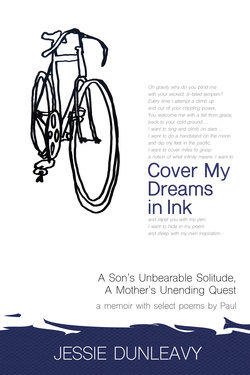Читать книгу Cover My Dreams in Ink: A Son's Unbearable Solitude, A Mother's Unending Quest - Jessie Dunleavy - Страница 8
На сайте Литреса книга снята с продажи.
ОглавлениеAuthor’s Note
I HAVE ALWAYS been told that I have a good memory, and I guess I do. I know some studies suggest that the brain transforms stressful or traumatic experiences into more lasting memories, which could account for some of my clarity on the events detailed in these pages. But I remember the good times too, and we had plenty of them.
I could not, however, have completed this project without the journals that I kept over the years. Funny, because I am not a born journaler. It’s just that, in caring for Paul, I had to write things down. And not because the act of writing was therapeutic for me, but because I was trying to make sense of it all, keeping track, understanding my role. In addition to my notes, I drew from Paul’s school and medical records and, of course, his journals.
The fact is, I throw nothing away. I don’t clear out my emails or voicemail messages as I should, and I shudder to even think about all that’s stowed in my attic. It occurs to me that there could be a correlation between hoarding and a good memory, with both representing a tendency to hang on, no matter what, when maybe what you need is to declutter—to sort out what’s worth keeping and dump the rest.
Writing this memoir was healing in ways that I didn’t anticipate at the outset, a time when—in spite of my overwhelming drive to take it on—I was uncertain of where it would go. More than a few friends have suggested it was my way of continuing the fight for Paul. Maybe it was. In the beginning, I was dedicated to the process—absorbed in gathering the information and pulling it together. As it unfolded, there were times when I felt as though it was leading me, instead of the other way around—a reality I couldn’t easily explain other than to say it took on a life of its own.
I came to see that recalling painful events catapults you back in time, forcing you to live them again and to suffer just as you did. But, then, getting these experiences down on paper—putting them out there—in many ways frees you from the burden of what you may have kept hidden from others, and even worked hard to do. And whether it was stoicism or secrecy that motivated stuffing it down, keeping it to yourself, it’s freeing to let it out. A weight, lifted.
In the end, seemingly disparate segments of the past converged to expose connections otherwise unknown to me. What I hope readers take away, more than a knowledge of the struggles or the heartaches we may have faced, is the discovery of a deeper truth, one that doesn’t dwell in the past but informs the future. In other words, the value lies not in what I brought to it, but in what it brought to me and hopefully to others.
This memoir draws on my personal knowledge and depicts actual events that took place in my life. All people are real, but some names and settings have been changed to protect privacy.
I should mention that I chose not to correct Paul’s spelling, a decision I wrestled with, and one that I may feel differently about tomorrow. After all, the best of writers have editors. But I decided that Paul’s idiosyncrasies were integral to knowing him. There were certain conventions or societal norms that he just didn’t get. A square peg in a round hole. An exception to the rule. Regardless of how his distinctiveness may have been characterized, I didn’t want to smooth over any of it.
